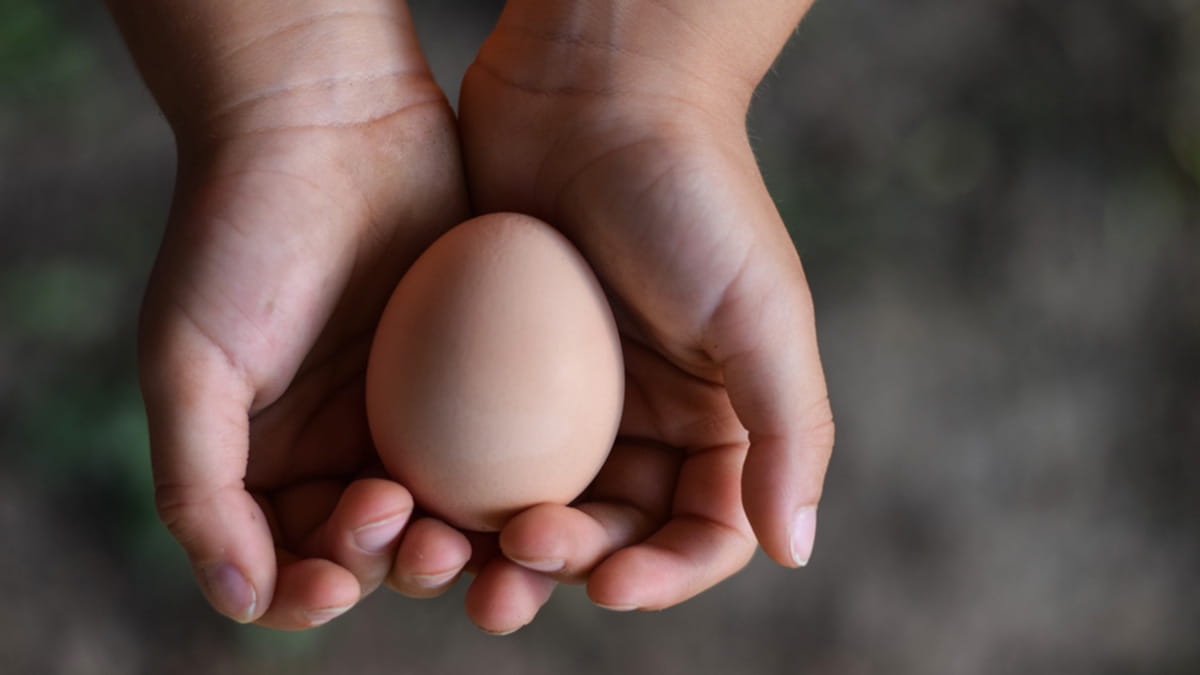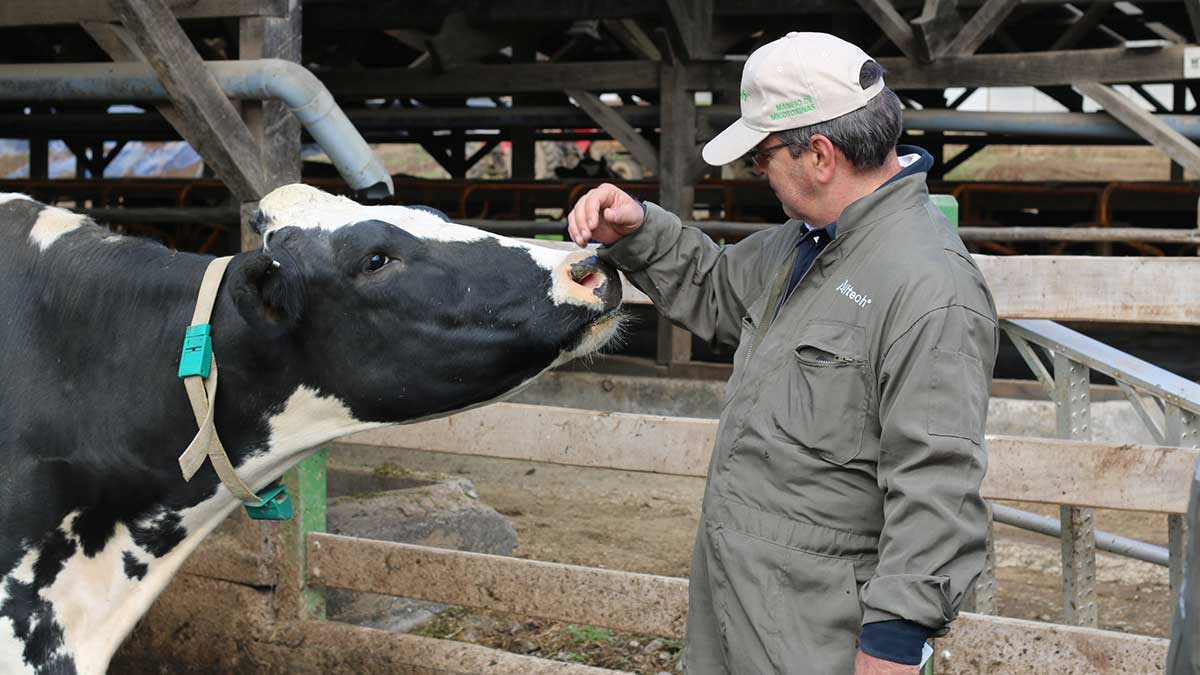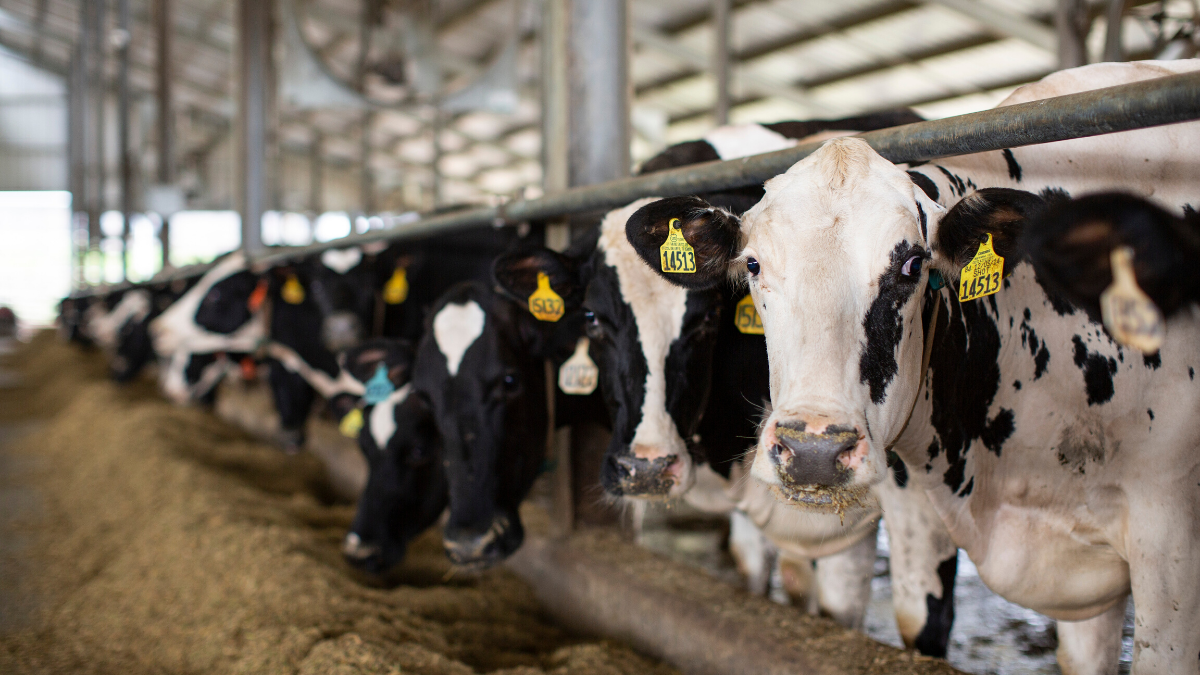Ken Zuckerberg - Remaking the market: COVID-19 and consumer trends
Producers are faced with new challenges as consumers adapt to eating more meals at home in light of the COVID-19 crisis. Will we return to “normal” when the outbreak subsides, or will new habits create a permanent shift in how we eat? Ken Zuckerberg, lead analyst and senior economist in CoBank’s Knowledge Exchange division, explains how the pandemic has already affected the food sector and what economic and market trends may emerge.
This episode is part of a special AgFuture series on the impact of COVID-19 on the food supply chain. Join us to hear how those on the frontlines of the global pandemic are working to overcome adversity and feed the world.
Hosted by Michelle Michael
As lead video producer at Alltech, Michelle travels the globe for the company’s award-winning Planet of Plenty™ documentary series. Michelle spent a decade as a video producer/reporter in Germany, reporting from military hotspots at the height of the war on terrorism. The National Press Photographer's Association (NPPA) has twice recognized Michelle as their solo video journalist of the year.
Co-produced by Brandon Whitworth
As the senior media production specialist at Alltech, Brandon co-produces the company’s award-winning Planet of Plenty™ documentary series. Brandon is a two-time Emmy Award winning television news photojournalist and three-time nominee. He has received several regional awards from the National Press Photographers Association for excellence in visual storytelling.
The following is an edited transcript of Michelle Michael’s interview with Ken Zuckerberg. Click below to hear the full audio.
Michelle: Hello! I'm Michelle Michael. In this special series of AgFuture, we're talking with those working along the food supply chain about the impact of COVID-19. My guest today is Ken Zuckerberg. Ken is the lead analyst and senior economist in CoBank's Knowledge Exchange division, where he focuses on grains, oilseeds, farm supply and biofuel. That translates to me that, well, you're a numbers guy — is that right, Ken?
Ken: Correct, although not simply just a numbers guy. The interesting part of the job is going through the numbers and then triangulating with market information to understand, really, where we are, where we're going and what the marketplace may be missing.
Michelle: So, in your role, you look at data, you look at patterns, you look at trends and economic activity, and you use those predictions to improve business decisions in agriculture. Also, just some background on CoBank: CoBank is one of the largest private providers of credit to the U.S. rural economy. The company is located in Colorado and delivers loans, leases and other financial services to agribusinesses in all 50 states. Is that right, Ken?
Ken: Generally, that's spot on. We operate within the Farm Credit System, which, as you know, is the largest lender to agriculture in rural America and the United States.
Michelle: Ken, COVID-19's global spread may continue to impact supply chains and the availability of certain crops, which is also potentially affecting commodity prices and farmers’ planning decisions. How do you look at the risk of COVID-19 from a very high level?
Ken: Thank you for asking that, to begin with. Strictly speaking, there are five bullet categories of risk facing every economic sector in every region of the world. These categories can be thought of as economic risk, environmental risk, geopolitical risk, societal risk and technological risk. Coronavirus falls strictly under the societal risk bucket, given that it's an infectious disease. However, the dynamics of treating it and what we've seen in terms of the resulting job losses and the massive contraction in economic activity — that actually puts coronavirus into two buckets: both the economic and the societal. It lies at the intersection of those two, and there are sort of broad ramifications for not delaying this quickly. The longer it goes on, the more uncertainty there is. The more uncertainty, the greater the economic damage. Then, because of those, if that scenario unfolds, the longer and harder it is to sort of get back to what people hope to be, back to normal.
Michelle: Ken, how does COVID-19 impact the food and agriculture sector?
Ken: Let me start with the labor and supply chains. We've gotten a lot of questions about both recently, and I think it's worth addressing, to begin with. Specialty crops are labor-intensive, and places like California (are) often dependent on noncitizens working in the U.S. either during the season or on a temporary basis — hence, closing borders and limiting temporary work passes to contain the virus spread obviously would be negative. Partially offsetting this, people are losing their jobs in other sectors, such as the restaurant and hospitality industries, and those (people) could theoretically come to work in agriculture, although that remains to be seen.
Another issue, of course, is employees that potentially get sick that work in food processing plants, grocery stores and restaurant takeout or delivery. These are some of the issues, from a labor standpoint, that we're monitoring closely. On supply chains, it's a bit of a mixed bag for now, but we're watching closely to see if things change in the future. In a recent report about the spring 2020 planting season, I argue that ag retailers in the U.S. have adequate supplies of crop inputs to deliver to customers this season. So, from a farm input supply chain perspective, we're not so concerned. We don't think it's a near-term risk. It is clear, though, that, given the amount of imported fertilizers, chemicals and feed ingredients made in China and brought to the U.S., the longer this goes on, the bigger that risk could be down the line, but we view that as a forward risk rather than a current one.
A more concerning matter, with respect to supply chains in the U.S., is truck drivers and truckers and transporters dealing with the splintered delivery networks and an upsurge in retail demand as consumers start buying more food at grocery stores and away from restaurants. The surge in that area is sort of causing bottlenecks in other delivery channels. Again, we are monitoring this for agriculture, production ag. We don't see too fat of a risk in the near term, but the situation is very dynamic.
Michelle: Of course, facing uncertainty in a volatile industry is nothing novel at all for the American agriculture industry. Farmers are very hearty. They're full of perseverance and innovative thinking. Will farmers and producers rise to the occasion, or will this time be different? What are the critical factors at play today versus what you expected as you headed into 2020?
Ken: I agree with you about your assertion of the American farmer. He and she do not go down easily. I have confidence that, generally speaking, production agriculture will rise to the occasion. However, there are a few critical factors and variables that the industry has to deal with that, quite candidly, they probably haven't dealt with ever before, even during the Great Depression. The continued economic uncertainty and volatility in markets, shipping network supply chains overseas and the shocks to demand — these are going to be negative issues for agriculture exports in the very near term.
Another pressure is, given the high levels of global financial market (pressure) on people, the more this goes on, the more that foreign investors tend to drive into U.S. dollar-denominated assets, meaning the dollar. The stronger the dollar, the more expensive our products are for overseas buyers, and, obviously, that would be a negative. The greater strength in the dollar, the more pressure on how competitive ag exports are relative to other major production regions.
Michelle: One of the challenges crop producers were facing before this pandemic was global trade wars that were occurring, particularly with China. What has changed since COVID-19?
Ken: In one sense, the entire world has changed with COVID-19. Obviously, the critical questions that we're all asking ourselves are “Can things return to normal — or, alternatively, a new normal?” and “What will domestic and export demand look like for ag products when we get there?” Right now, it's too early to make a broad call on any of that. That being said, U.S. agriculture has a reputation for very high quality. Recently, we've seen an uptick in demand for certain crops, such as wheat. Here in the U.S., we have adequate stocks, high-quality and attractive prices. China has been a buyer there, and they've also been buying soybeans and pork. Last week, in fact, was a record for U.S. pork exports to China.
The world has changed. There have been demand shocks, market shocks, economic shocks, since both COVID-19 and the Saudi Arabia-Russia oil price war has broken out. However, we do see agriculture as a go-to sector. As people commonly say, you'll always have to eat. So, it does tend to be resilient, even when the other parts of the economy are in trouble.
Michelle: Farmers are, of course, used to sacrifice. But when it comes to financial stability, what exactly are farmers facing today in the midst of COVID-19?
Ken: I think it's important to step back a minute and discuss what was the situation prior to the current crisis. Before that, crop farming had already entered the seventh or eighth year of a difficult pricing cycle. When we combined both crop and livestock farming together, the industry revenues actually had been flat with the 2011 level. However, production expenses continue to rise. The industry, in total, has been operating under profit pressure.
Another negative is that work in capital has been declining while debt has been increasing to record levels. Debt-to-net-cash income is also very high for the industry on a consolidated basis. While reported numbers show that net farming income rose in 2019, it did so only because of substantial government payments. Backing that out, income was actually down.
The bottom line is that farming, in general, has been under some pressure, and there is a massive divide between profitable and unprofitable farmers. The weaker ones, unfortunately, will have limited flexibility to play through the current crisis, and they ultimately may be forced to sell, exit or consolidate operations. We saw an uptick in financial restructurings for U.S. farms in 2019. Unfortunately, we think this could continue in 2020.
Michelle: Are farmers even able to prepare for something like that? This is unprecedented, of course.
Ken: COVID-19 is unique in that, regardless of income level, industry expertise or desire, very few businesspeople in general were adequately prepared for this. I think the characteristics that allow a U.S. farmer to manage through here come down to A) are you a low-cost operator? Do you have command of the variable inputs that are required to produce your crop? And/or B) are you overextended? So, the more financially conservative a farmer is, the greater he or she has the ability to operate beyond the current season.
Michelle: Let's talk about trends for a moment, since that's definitely your expertise. What short-term trends are we going to see in agriculture as related to COVID-19?
Ken: At the risk of observing the obvious, how consumers are purchasing food and what they are buying has clearly changed since the onslaught of COVID-19. We obviously first saw bulk purchases of Clorox products, hand sanitizers, toilet paper and canned goods. Now, a shift is happening that's more substantial — away from sit-down restaurants, many of which are closed in areas that have shelter-in-place restrictions, and the shift has gone towards buying food from supermarkets and other food retailers, including mail-order, home delivery and food delivery. Those are some of the short-term trends and observations we've seen that are likely to continue as long as this crisis is underway.
Michelle: Can we, in any way, predict the longer-term effects from this pandemic?
Ken: It's very difficult. What I think is fascinating is that, to the extent one observed a few years ago that some of the higher-growth categories in food were purchases of food either through fast-casual or specialty restaurants, that was in some ways cannibalizing sales at the supermarket. Now, the supermarket is the go-to place, with lines out the door and, oftentimes, limits of people going in. I think purchases of food for home consumption will probably continue at a greater level than had been (seen) during previous shocks, and part of the issue there is if people are genuinely concerned about being around other people that may get them sick, I think there's a likelihood that at least this dynamic will continue for a while.
Predicting long-term trends is inherently complicated. What I know I fundamentally feel is that this, too, will eventually pass. I think the business in the industrial case of food service out of the home will continue. But getting back to the same level of consumption out of the house? It's hard to determine when that's going to take place.
Michelle: Of course, many people are under stay-at-home orders. Social distancing has pretty much everybody stuck inside their own home at a time when gasoline prices are way down. What is the impact of the recent drop in gasoline prices on agricultural production?
Ken: There are two sides to that coin. The first one is that you're correct in that fuel and energy are important inputs — and costly ones — in agricultural production. The drop in gas prices, all else being equal, is very positive operationally. However, the demand shock and the price decline in gasoline prices has carried over to the ethanol industry to the point where the dynamics of operating an ethanol plant with margins under pressure because of the current price and demand dynamics is extraordinary. Unfortunately, the recent drop in gasoline prices is a mixed bag, and the focus now is on what the ethanol industry can and will be able to do to reposition itself to survive this downturn.
Michelle: It's hard to think about opportunity in the middle of a crisis, but if that's at all possible, what opportunities might you see coming from this?
Ken: I think there are opportunities. Crisis and chaos always give innovative people an opportunity to capture and deliver value. This time will be no different. Here are a few ideas about potential opportunities. Unexpectedly, wheat is seeing a surge in demand with the hoarding, if you will, of shelf-stable food at the supermarket. While this may only be temporary, it's interesting. Wheat is seeing a little bit of opportunity.
Labor shortages could help accelerate the adoption of farm robots to handle spraying and picking fruit crops. We have a number of companies that are already operating in that space, and that could be an interesting place to be going forward. Increased demand for food and grocery deliveries may also be the saving grace for certain meal kit and online food platform delivery companies. Finally, a renaissance in home-prepared meals and gourmet cooking might lead to increased buying of fancy pots, pans and kitchen accessories. In some ways, we see dollars shifting to the Krogers of the world, as well as the Amazons of the world, as well as some of the Blue Aprons and others. But who knows? Maybe the fancy home-houseware companies could also see a pickup here during or post-crisis.
Michelle: Ken, how do you envision market segments? What I mean is restaurants are shutting down, but grocery stores are staying open. How do you envision market segments dictating supply chain moving forward?
Ken: Much as we had discussed before, it's very hard to know whether this will be a temporary bull market in grocery stores relative to restaurants — how long that will last, will it be permanent, or there will be a shift. It's very hard to estimate that. That being said, I think there will undoubtedly be either stresses or disruptions related to packaging, shipping and delivery but also the product mix. For example, people that pay $50 for a New York strip steak in a restaurant may or may not be willing to pay a premium at the supermarket. I'm actually not sure; I think the likelihood is that they won't. There are other product categories that also face similar dynamics. With more people eating at home, there's a greater need for a variety of consumer staple foods. To the extent that that will be in demand, that will ultimately shift priorities both in production and distribution.
Michelle: American farmers provide a commodity that consumers will always need. It's important to remember that the bottleneck in supply and demand is really only a temporary obstacle as health officials everywhere focus on containing the coronavirus outbreak. At the end of the day, Ken, what is your biggest concern at this time?
Ken: My biggest concern is that we see globally interconnected markets that are, at the end of the day, very sensitive to competence. The good news about food and ag production is that this industry can be, oftentimes, countercyclical. When the broad economy is under pressure, food and agriculture can be a steady staple. As we said before, we have to eat. The risk is that the longer we go through a period where there's uncertainty, the greater the structural changes are in demand, and how to rectify that. The bigger risk for me is time. The longer this COVID-19 crisis goes out, the longer the economic uncertainty.
Michelle: Ken Zuckerberg, senior economist from CoBank, thank you so much for joining us today.
Ken: Wonderful to be with you.
Michelle: For additional resources on COVID-19, visit Alltech.com.
Click here for additional COVID-19 resources.
- Read more about Ken Zuckerberg - Remaking the market: COVID-19 and consumer trends
- Log in to post comments

When the broad economy is under pressure, food and agriculture can be a steady staple.






















